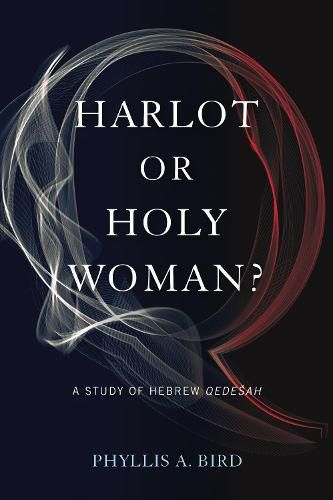Readings Newsletter
Become a Readings Member to make your shopping experience even easier.
Sign in or sign up for free!
You’re not far away from qualifying for FREE standard shipping within Australia
You’ve qualified for FREE standard shipping within Australia
The cart is loading…






Harlot or Holy Woman? presents an exhaustive study of qedesah, a Hebrew word meaning consecrated woman but rendered prostitute or sacred prostitute in Bible translations. Reexamining biblical and extrabiblical texts, Phyllis A. Bird questions how qedesah came to be associated with prostitution and offers an alternative explanation of the term, one that suggests a wider participation for women as religious specialists in Israel’s early cultic practice.
Bird’s study reviews all the texts from classical antiquity cited as sources for an institution of sacred prostitution, alongside a comprehensive analysis of the cuneiform texts from Mesopotamia containing the cognate qadistu and Ugaritic texts containing the masculine cognate qds. Through these texts, Bird presents a portrait of women dedicated to a deity, engaged in a variety of activities from cultic ritual to wet-nursing, and sharing a common generic name with the qedesah of ancient Israel. In the final chapter she returns to biblical texts, reexamining them in light of the new evidence from the ancient Near East.
Considering alternative models for constructing women’s religious roles in ancient Israel, this wholly original study offers new interpretations of key texts and raises questions about the nature of Israelite religion as practiced outside the royal cult and central sanctuary.
$9.00 standard shipping within Australia
FREE standard shipping within Australia for orders over $100.00
Express & International shipping calculated at checkout
Harlot or Holy Woman? presents an exhaustive study of qedesah, a Hebrew word meaning consecrated woman but rendered prostitute or sacred prostitute in Bible translations. Reexamining biblical and extrabiblical texts, Phyllis A. Bird questions how qedesah came to be associated with prostitution and offers an alternative explanation of the term, one that suggests a wider participation for women as religious specialists in Israel’s early cultic practice.
Bird’s study reviews all the texts from classical antiquity cited as sources for an institution of sacred prostitution, alongside a comprehensive analysis of the cuneiform texts from Mesopotamia containing the cognate qadistu and Ugaritic texts containing the masculine cognate qds. Through these texts, Bird presents a portrait of women dedicated to a deity, engaged in a variety of activities from cultic ritual to wet-nursing, and sharing a common generic name with the qedesah of ancient Israel. In the final chapter she returns to biblical texts, reexamining them in light of the new evidence from the ancient Near East.
Considering alternative models for constructing women’s religious roles in ancient Israel, this wholly original study offers new interpretations of key texts and raises questions about the nature of Israelite religion as practiced outside the royal cult and central sanctuary.